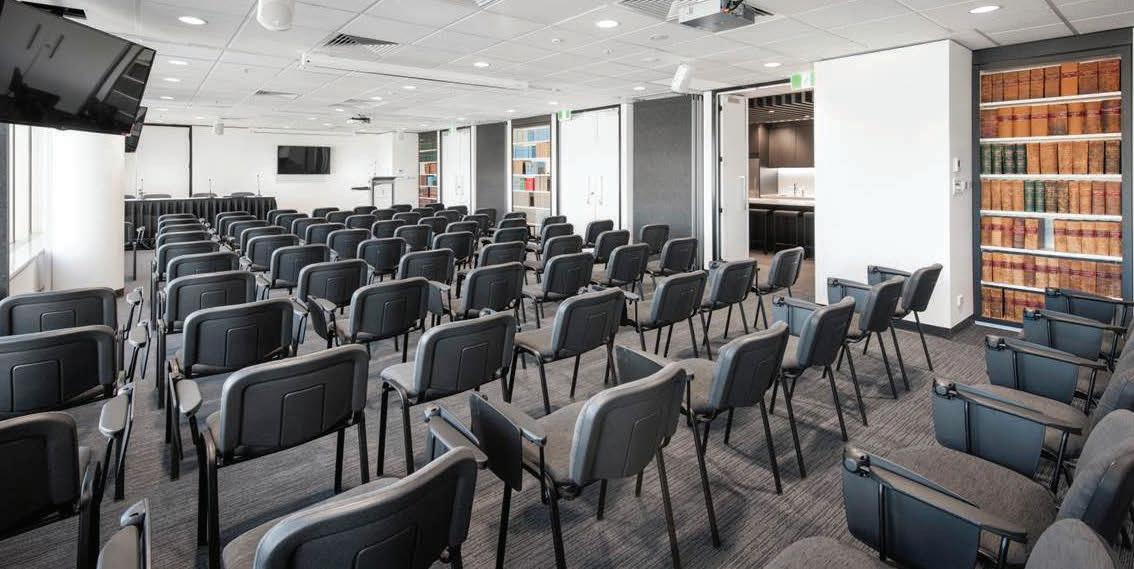
10 minute read
Loot boxes in Australia: Gaming or gambling – By Jamie Nettleton & Aleksandra Pasternacki
LOOT BOXES IN AUSTRALIA: GAMING OR GAMBLING?
JAMIE NETTLETON, JOSEPH ABI-HANNA & ALEKSANDRA PASTERNACKI, ADDISONS GAMBLING LAW
Advertisement
INTRODUCTION L oot boxes are a common feature in video games. Any person who has played a video game online in the last decade is likely to have encountered a loot box in one guise or another. In essence, a loot box is a video game feature which enables players to earn randomised virtual items which can be used to enhance an individual’s game play or experience. 1 This article will provide a legal insight into loot boxes. Globally, gambling regulators have reached divergent opinions on whether loot boxes fall within the scope of gambling. In 2018, the Australian Senate conducted an Inquiry on Gaming Micro-Transactions for Chance-Based Items (the Loot Box Inquiry). The single recommendation of the Loot Box Inquiry report (the Report) was that a comprehensive review of loot boxes in video games ought to be conducted. 2
In its response to the Report earlier this year, the Australian Government did not consider it necessary to authorise a formal department review of loot boxes at a Federal level. 3
This has left the future of loot box regulation in Australia in a state of uncertainty.
WHAT IS A LOOT BOX?
The term loot box does not have a settled meaning. In fact, some academics have argued that “the term ‘loot box’ and the phenomena it covers are not sufficiently precise for academic use.” 4 In the Report, the concept of “microtransactions” was preferred over the term loot boxes. Micro-transactions were defined as “any model that provides a consumer with the option of making small purchases within a game or other application.” 5 Irrespective of terminology, certain elements underpin a loot box or a microtransaction. A player is required to advance something of value in the context of the game, such as game points earned through gameplay, or something of real-world value, such as money. Once this valuable thing is advanced, the game will generate randomly the chance to win (or earn) a virtual item for the player (a reward). Hence, a loot box is inherently a transaction, as the player expends something of value in exchange for the opportunity to receive something that may be of value.
The virtual items found in loot boxes vary from game to game, however, they consist generally of items which can be used to enhance a player’s game play or cosmetic items, being items which do not affect game play but which affect the aesthetics or appearance of certain elements in the game. These cosmetic items are sometimes called “skins”. In some games, skins may be bought and sold on platforms hosted by third parties.
ARE LOOT BOXES GAMBLING?
Under Australian Federal law, an activity may fall within the scope of gambling if it involves each of the following three elements: 1. Consideration – A person must provide something of real-world value to enter the activity; and 2. Prize – The player has the opportunity to win a prize of tangible value (i.e. money or money’s worth); and 3. Chance – The outcome of the activity involves an element of luck or “chance”. 6 When a player uses real-world money to purchase, or to acquire an opportunity to purchase, a virtual item in a loot box, the player has provided something of value. If the virtual item can be exchanged for money or money’s worth, that virtual item may be considered a prize. As the virtual
THE BULLETIN February 2020 items in the context of a loot box are randomly generated by the software of a game, it may be said that the randomness is akin to the notion of chance or luck. Therefore, an argument exists that these forms of loot boxes amount to gambling. Gambling regulators in certain overseas jurisdictions have applied their existing laws to the concept of loot boxes and have arrived at the conclusion that certain loot boxes constitute gambling, as each jurisdiction has a different legal definition of gambling. In 2017, New Zealand’s Department of Internal Affairs stated that loot boxes did not meet the legal definition of gambling. 7
The French Gambling Authority, Autorité de régulation des jeux en ligne, took a similar approach to loot boxes. 8 In 2018, regulators in Belgium, 9 Denmark 10
and the Netherlands 11 determined that loot boxes involving the payment of real-world money satisfy the elements of gambling under their respective laws and, as such, are subject to the various prohibitions on gambling set out in those laws. More recently, a UK House of Commons committee recommended that the UK Government should regulate loot boxes that can be purchased with real-world money under the Gambling Act 2005 (UK). 12
AUSTRALIA AND THE LOOT BOX INQUIRY Loot boxes have also been considered by the Australian Government and state and territory governments. Most notably, in 2013, former South Australian Senator Nick Xenophon introduced a Bill into the Australian Senate which sought to bring activities within games involving both the purchase of virtual items with realworld money and “gambling” with virtual items within the scope of the definition
of a “gambling service” under Australian Federal law. 13
However, the Bill was not passed by the Australian Senate.
In 2018, the Senate Environment and Communications References Committee (the Senate Committee) conducted the Loot Box Inquiry. The Senate Committee was tasked with determining the extent, if any, to which loot boxes may be harmful, with particular reference to whether the purchase of chance-based items, combined with the ability to monetise these items on third-party platforms, constitutes a form of gambling. 14 In particular, the Senate Committee considered whether loot boxes satisfied the legal and psychological definitions of gambling. 15
Given the diversity of game features which may be considered loot boxes, the Senate Committee noted the difficulty of making definitive statements regarding loot boxes. 16 However, the Senate Committee did recognise a broad consensus that, where real-world money is exchanged (that is, when loot boxes are purchased, where virtual items are bought and sold, or where both occur), those loot boxes most closely meet the definitions of gambling (both regulatory and psychological). 17
Players may be exposed to risks in this context, including the risk that loot boxes may cause gambling-related harm. The Committee noted the vulnerability of certain groups to these risks, including children and people with mental health issues. 18 In the Report, the Senate Committee recommended that the Australian Government undertake a comprehensive review of loot boxes in video games, which would have required consideration of whether specific regulation is appropriate for loot boxes. 19
In March 2019, the Australian Government released its response to the Report. The Government decided not to follow the recommendation. The Government cited the lack of research into gambling-related harms as a result of loot boxes as its reason for refraining from undertaking a comprehensive review, and stated “that developing an evidence-based regulatory approach to mitigate against any harms is challenging until further research is complete”. 20
THE CURRENT REGULATORY FRAMEWORK
At present, there is no specific regulatory framework in Australia targeted at loot boxes. Video games, or “computer games”, are subject to the National Classification Scheme, which is administered under the Classification (Publications, Films and Computer Games) Act 1995 (Cth) and a co-operative agreement between the Commonwealth, state and territory governments. However, the National Classification Scheme is focussed only on gambling and not on game features such as loot boxes. 21 In the absence of a targeted regulatory framework, the Senate Committee considered several potential regulatory options, including the imposition of a MA15+ or R18+ rating for computer games containing loot boxes, a mandatory descriptor on all video games containing loot boxes, self-imposed and/or parental controls on interactions with loot boxes, compulsory disclosure of odds associated with loot boxes and an outright prohibition on loot boxes. 22
However, the Senate Committee did not recommend adopting any of these options based on current evidence.
The Australian Consumer Law (ACL) 23
may be a potential avenue for the regulation of certain aspects of loot boxes. For example, it is possible that certain loot boxes could be misleading or deceptive to a consumer, particularly loot boxes which do not disclose the likelihood (or chance) of winning specific kinds of rewards. Hence, if the ACL (as an existing law) were utilised to regulate these loot boxes, it may remove the need for implementing a targeted regulatory framework.
THE FUTURE
In the absence of formal regulation of loot boxes, certain industry participants have removed or altered the loot boxes they offer, and will continue to do so. 24 These approaches indicate a move towards “self-regulation”.
Self-regulation is not new to the video game industry. For example, following recommendations from the Japanese authorities as to which types of loot boxes should be banned, the Japanese mobile gaming industry engaged in self-regulation. The Japanese model has achieved a degree of success without the imposition of formal constraints on loot boxes. 25 Following the Australian Government’s response to the Report, it is unlikely to take any further action with respect to the regulation of loot boxes in the near future. This means that, for the moment, self-regulation is the default position in Australia.
However, both the emerging body of research on loot boxes and developments overseas may cause the Australian Government to reconsider its stance in the not too distant future; it would surprise no one if the Australian Government dipped its toe back into the murky waters of the regulation of loot boxes in the years to come.
Note: The authors are members of the Addisons Gambling Law team. B
Endnotes 1 For more on the concept of loot boxes, see Brendan Scott, ‘Loot Boxes drawing regulatory attention’ (November 2018) Internet Law Bulletin 124, 124; Sally Gainsbury, ‘Gaming-Gambling Convergence: Research, Regulation, and Reactions’ (2019) Gaming Law Review 23(2) 80; Edwin Hong, ‘Loot Boxes: Gambling for the Next Generation’ (2019) Western State Law Review 46(1) 61. 2 Environment and Communications References Committee, Parliament of Australia, Gaming micro-transactions for chance based items (Report, November 2018) (‘Loot Box Inquiry report’) 73. 3 Parliament of Australia, Government Response to the Gaming micro-transactions for chance based items inquiry (Government response, March 2019) (‘Government Response’). 4 RKL Nielsen and P Grabarczyk, ‘Are Loot Boxes Gambling?’ (2019) 4(3) Transactions of the Digital Games Research Association 171, 172. 5 Loot Box Inquiry report (n 1) 2. 6 Interactive Gambling Act 2001 (Cth) s 4 (definition of ‘Gambling Service’) (‘IGA’). 7 See, eg, Katherine Cross, ‘New Zealand says lootboxes ‘do not meet the legal definition for gambling’, Gamasutra (News report, 11 December 2017) <https://www.gamasutra. com/view/news/311463/New_Zealand_says_ lootboxes_do_not_meet_the_legal_definition_


for_gambling.php>. 8 See generally Stefanie Fogel, ‘French Regulator Criticizes Loot Boxes but Says They’re Not Gambling’, Variety (News report, 5 July 2018) < https://variety.com/2018/gaming/news/franceloot-boxes-1202865706/>. 9 See generally Newsbeat, ‘Gaming loot boxes: What happened when Belgium banned them?’ BBC News (News report, 12 September 2019) < https://www.bbc.com/news/ newsbeat-49674333>. 10 Danish Gambling Authority, Statement about loot boxes / loot crates (Statement, November 2017) <https://www.spillemyndigheden.dk/en/news/ statement-about-loot-boxes-loot-crates>. 11 Netherlands Gambling Authority, Press Release loot boxes (Press Release, April 2018) <https:// kansspelautoriteit.nl/english/loot-boxes/>. 12 The Digital, Culture, Media and Sport Committee, Immersive and Addictive Technologies report (Report, 12 September 2019). 13 Interactive Gambling Amendment (Virtual Credits) Bill 2013. 14 Loot Box Inquiry report (n 1) 1. 15 Ibid Chs 2-3. 16 Loot Box Inquiry report 71-2. 17 Loot Box Inquiry report (n 1) 72. 18 Ibid. 19 Ibid 73. 20 Government Response (n 3). 21 Marissa Dickins and Anna Thomas, Is it gambling or a game? Simulated gambling games: Their use and regulation (AGRC Discussion Paper, April 2016) 13. 22 Loot Box Inquiry report (n 1) 53-68. 23 Competition and Consumer Act 2010 (Cth) sch 2 (‘Australian Consumer Law’’). 24 See generally Connor Cable, ‘Rocket League is Removing Loot Boxes Later This Year’, 25YearsLater (Webpage, August 2019) <https://25yearslatersite.com/2019/08/19/ rocket-league-is-removing-loot-boxes-laterthis-year/>; Austin Goslin, ‘PUBG is finally ditching random locked loot boxes’, Polygon (Webpage, 19 November 2019) https://www. polygon.com/2019/11/19/20972315/. pubgpaid-loot-box-system-patch>; Kyle Orland, ‘So long, supply drops: Call of Duty gets rid of randomized loot boxes’, ArsTechnica (Webpage, 18 October 2019) <https://arstechnica.com/ gaming/2019/10/so-long-supply-drops-call-ofduty-gets-rid-of-randomized-loot-boxes/>. 25 Brendan Sinclair, ‘Who is responsible for loot boxes? Voices from around the industry share their thoughts on what’s at stake and who should be doing what’, gamesindustry.biz (Webpage, 16 May 2019) <https://www.gamesindustry.biz/ articles/2019-05-16-who-is-responsible-for-lootboxes>.










